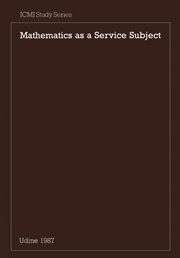Book contents
- Frontmatter
- Contents
- Foreword
- On the teaching of mathematics as a service subject
- What mathematics should be taught to students in physical sciences, engineering, …?
- Mathematics as a service subject – Why?
- Teaching first-year students
- Teaching mathematics to engineering students utilising innovative teaching methods
- Discrete mathematics: some personal thoughts
- Mathematical education for engineering students
- Some reflections about the teaching of mathematics in engineering schools
- Teaching mathematics as a service subject
- A Final Statement
- List of Participants
- Contents of Selected Papers on the Teaching of Mathematics as a Service Subject
Some reflections about the teaching of mathematics in engineering schools
Published online by Cambridge University Press: 26 April 2011
- Frontmatter
- Contents
- Foreword
- On the teaching of mathematics as a service subject
- What mathematics should be taught to students in physical sciences, engineering, …?
- Mathematics as a service subject – Why?
- Teaching first-year students
- Teaching mathematics to engineering students utilising innovative teaching methods
- Discrete mathematics: some personal thoughts
- Mathematical education for engineering students
- Some reflections about the teaching of mathematics in engineering schools
- Teaching mathematics as a service subject
- A Final Statement
- List of Participants
- Contents of Selected Papers on the Teaching of Mathematics as a Service Subject
Summary
This paper presents a few reflections resulting from a long experience teaching at the University and Engineering schools (Ecole Polytechnique, Ecole Supérieure d'Electricité) and industrial consulting. These reflections will probably appear unconventional and, may be, a little bit provocative. We shall therefore first indicate the limits of this presentation: it is strictly limited to the French system of education and to the only technical field familiar to the author, that is electronics in its modern day meaning, including the usual electronics of components and circuits, communications and radio and a large part of computer science and control theory. These correspond, for instance, to the scope of the French “Société des ingénieurs électriciens et électroniciens” or the American I.E.E.E.
Electronics is a field where education presents an especially acute problem in that the field has an amazing multiplicity, an accelerating evolution and resorts to an extensive mathematical background as signal theory or electromagnetics.
Choosing which branches of mathematics to teach becomes a real headache if one intends to cater for short term as well as for medium and long term needs.
The short term:
The short term is essentially concerned, within the University and Engineering schools, with mathematics that can be of use to the teaching of other fields and to the beginning engineer. At least in the French system the reality is often disappointing between the following extremes.
- Type
- Chapter
- Information
- Mathematics as a Service Subject , pp. 70 - 74Publisher: Cambridge University PressPrint publication year: 1988
- 1
- Cited by



